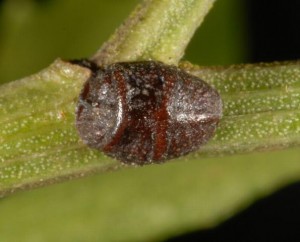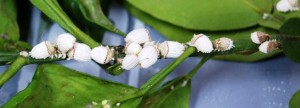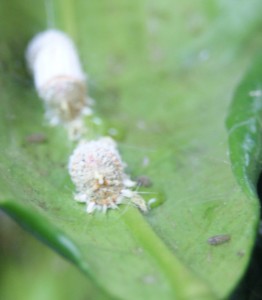
Many different species of scale insect infect citrus in North Florida, and mid spring is usually when gardeners notice them on their fruit trees and ornamental shrubs. Many different species of scale affect Florida homeowners and cause a host of problems in the garden and landscape. Citrus is particularly prone to scale infestations in North Florida.
The Satsuma Tangerine, Citrus unshiu, is currently a fruit that is highly prized by home gardeners in North Florida. Now is the time to act to prevent heavy scale infestations since weather is warming and control methods cannot be used when daytime temperatures are very hot. This pest has already been observed at multiple locations throughout the Florida Panhandle in both home gardens and commercial production areas.
Scale often reduces tree vitality by ingesting sap that would otherwise be used by the tree for growth and fruit production. They may also cause premature fruit drop and defoliation. A secondary pest that may occur as result of Scale is Sooty Mold. Sooty Mold lives off of the surgery secretions of the scale and can cause citrus leaves to look black and eventually drop.
The good news is that Scale is relatively easy to control when managed in winter or early in the spring growing season. From October through mid-May growers should use Horticultural Oil to control scale, particularly horticultural oil containing petroleum products. These products deprive scale insects of oxygen. This will smother them, but dead insects will need to be washed off if complete removal is desired.

Applications should be timed correctly since horticultural oil applications can burn plants once the outdoor temperature reaches 94 ® F. A good rule of thumb is to apply horticultural oil on cool and cloudy days to minimize leaf damage. Always consult the label of each individual product before application and never apply more than the recommended amount. This last statement is especially crucial for horticultural oil applications, since increased rates are highly likely to damage plants. For more information, please consult this UF / IFAS publication on Citrus Scale and the Citrus Pest Management Guide.

 0
0
